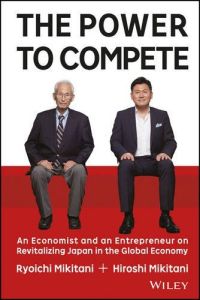Acesse a sua conta getAbstract para obter o resumo!

Acesse a sua conta getAbstract para obter o resumo!
Hiroshi Mikitani and Ryoichi Mikitani
The Power to Compete
An Economist and an Entrepreneur on Revitalizing Japan in the Global Economy
Wiley, 2014
Sobre o que é?
Father-son experts offer a detailed examination of Japan’s prolonged economic decline.
Recommendation
With its technological inventions and its people’s legendary work ethic, Japan once seemed poised to dominate the global economy. But since the early 1990s, Japan has lagged while the United States, China and other nations have surged ahead. This overview of Japan’s woes explains a litany of ill-informed policies, such as lifetime employment and excessive regulation. The narrative is crafted in the form of a dialogue between father and son: The father is the late Ryoichi Mikitani, once professor emeritus of economics at Kobe University and president and chairman of the Japan Society for Monetary Economics, and the son is Hiroshi Mikitani, founder, chairman and chief executive of Rakuten Inc. Their conversation makes this study of Japanese economic policy an accessible and intriguing read. getAbstract recommends this informed exploration of Japan’s economy to businesspeople and policy makers seeking insight into the limping tiger.
Summary
About the Authors
Hiroshi Mikitani is the founder, chairman and chief executive of Rakuten Inc. His father, Ryoichi Mikitani, who died in 2013, was professor emeritus of economics at Kobe University and president of the Japan Society for Monetary Economics, which he chaired from 1994 to 1998. Rakuten is a stockholder in getAbstract.





















Comment on this summary